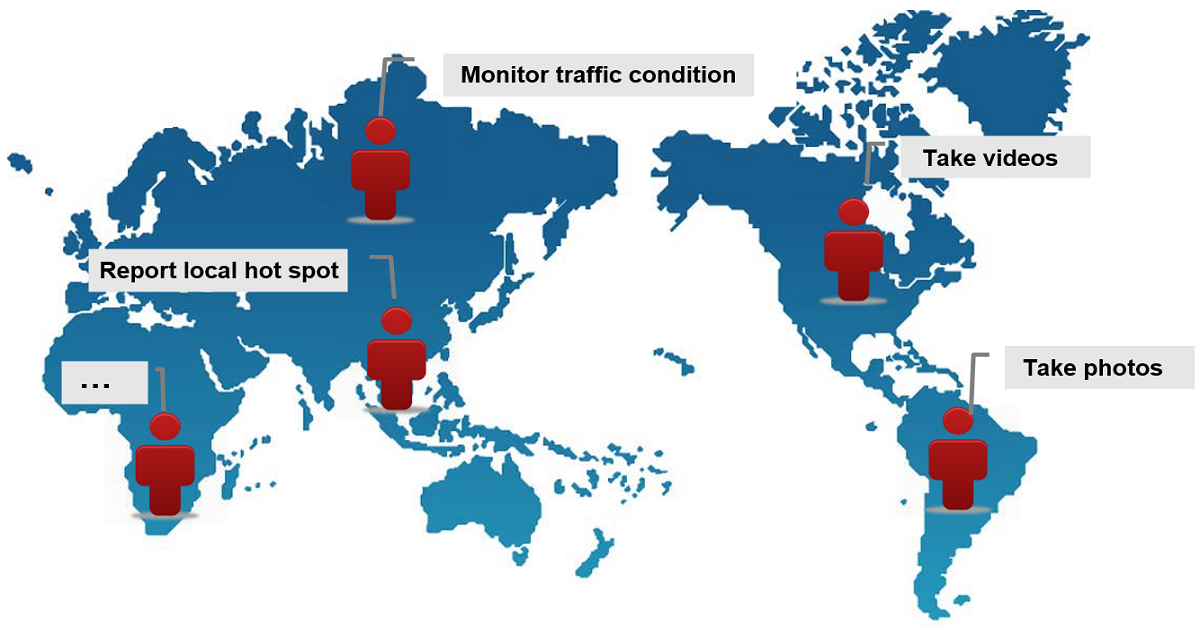Spatial Crowdsourcing
A special issue of Applied Sciences (ISSN 2076-3417). This special issue belongs to the section "Computing and Artificial Intelligence".
Deadline for manuscript submissions: closed (31 December 2023) | Viewed by 1273

Special Issue Editors
Interests: spatial crowdsourcing; data mining; machine learning; deep learning; trajectory analytics
Interests: spatiotemporal databases; trajectory computing; spatial crowdsourcing; recommendation systems
Special Issue Information
Dear Colleagues,
Crowdsourcing is a computing paradigm where humans actively or passively participate in the procedure of computing, especially for tasks that are intrinsically easier for humans than for computers. Many successful crowdsourcing platforms exist, e.g., Amazon Mechanical Turk (MTurk) and Wikipedia. Along with the ubiquity of GPS-equipped networked devices such as smartphones, a new class of crowdsourcing, called spatial crowdsourcing (SC), has drawn increasing attention in both academia and industry. With SC, requesters can issue spatial tasks (e.g., monitoring traffic conditions or picking up passengers) to SC servers that then assign workers to these tasks (called task assignment). The workers complete their tasks by physically moving to the specified locations. Spatiotemporal information (e.g., location, mobility, and the associated contexts) plays a crucial role in SC. Due to its natural connection to the physical world, SC is relevant to a wide spectrum of daily applications, including real-time ride-hailing services (e.g., Uber), on-wheel meal-ordering services (e.g., GrubHub), and public transportation services (e.g., Flex Traffic). These applications need specialized algorithms to accomplish effective and efficient task assignment.
This Special Issue on “Spatial Crowdsourcing” aims to engage with active researchers from spatiotemporal data management and spatial crowdsourcing communities to deliver state-of-the-art research insights into the effective and efficient task assignment process in spatial crowdsourcing. The Special Issue welcomes outstanding research papers, as well as review articles, devoted to innovative suggestions for AI-based or advanced technologies in the field of spatial crowdsourcing.
In particular, the topics of interest include, but are not limited to:
- Task assignment methodologies: methods and methodologies used for effective and efficient task assignment.
- Privacy-aware task assignment: areas include, but are not limited to, federated learning, new privacy protection mechanisms for trustworthy spatial crowdsourcing, and differentially private applications.
- Behavior analysis: understanding worker or task-requester behaviors in the context of spatial crowdsourcing.
- Fairness: a fair spatial crowdsourcing system is designed to balance its effective task assignment with potential biases caused by factors such as worker demographics, task exposure/popularity, etc.
- Surveys, evaluations, or benchmarking: surveys, evaluations, or benchmarking on state-of-the-art research in the area of spatial crowdsourcing.
Dr. Yan Zhao
Prof. Dr. Kai Zheng
Dr. Yawen Li
Guest Editors
Manuscript Submission Information
Manuscripts should be submitted online at www.mdpi.com by registering and logging in to this website. Once you are registered, click here to go to the submission form. Manuscripts can be submitted until the deadline. All submissions that pass pre-check are peer-reviewed. Accepted papers will be published continuously in the journal (as soon as accepted) and will be listed together on the special issue website. Research articles, review articles as well as short communications are invited. For planned papers, a title and short abstract (about 250 words) can be sent to the Editorial Office for assessment.
Submitted manuscripts should not have been published previously, nor be under consideration for publication elsewhere (except conference proceedings papers). All manuscripts are thoroughly refereed through a single-blind peer-review process. A guide for authors and other relevant information for submission of manuscripts is available on the Instructions for Authors page. Applied Sciences is an international peer-reviewed open access semimonthly journal published by MDPI.
Please visit the Instructions for Authors page before submitting a manuscript. The Article Processing Charge (APC) for publication in this open access journal is 2400 CHF (Swiss Francs). Submitted papers should be well formatted and use good English. Authors may use MDPI's English editing service prior to publication or during author revisions.
Keywords
- crowdsourcing
- spatial crowdsourcing
- task assignment
- privacy protection
- behavior analysis
- fairness
Benefits of Publishing in a Special Issue
- Ease of navigation: Grouping papers by topic helps scholars navigate broad scope journals more efficiently.
- Greater discoverability: Special Issues support the reach and impact of scientific research. Articles in Special Issues are more discoverable and cited more frequently.
- Expansion of research network: Special Issues facilitate connections among authors, fostering scientific collaborations.
- External promotion: Articles in Special Issues are often promoted through the journal's social media, increasing their visibility.
- Reprint: MDPI Books provides the opportunity to republish successful Special Issues in book format, both online and in print.
Further information on MDPI's Special Issue policies can be found here.





